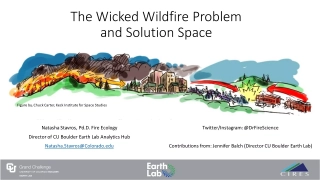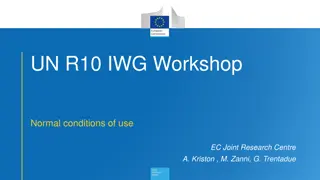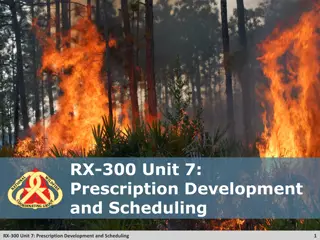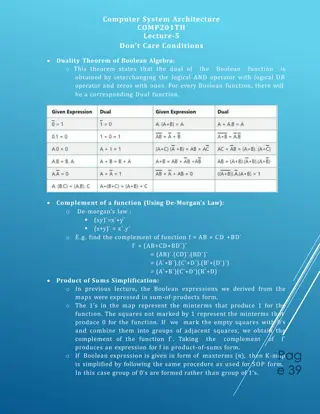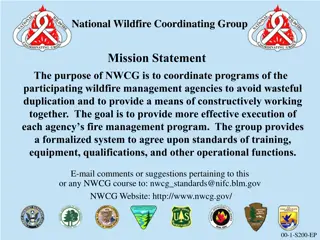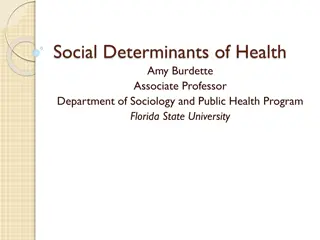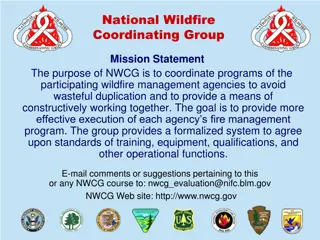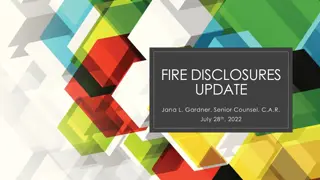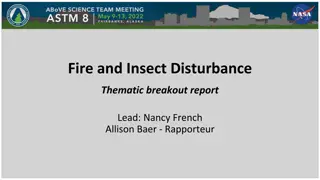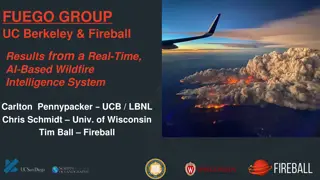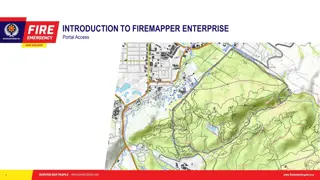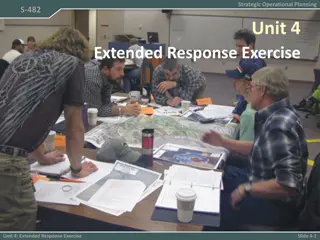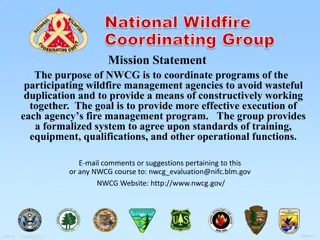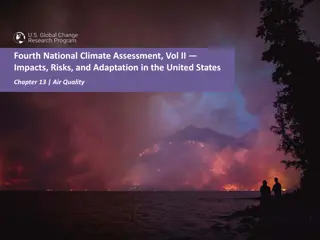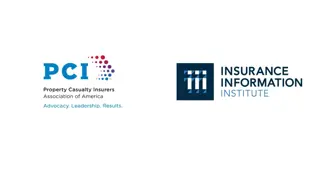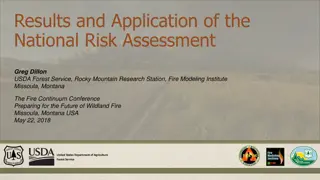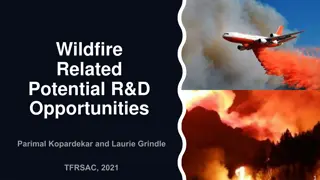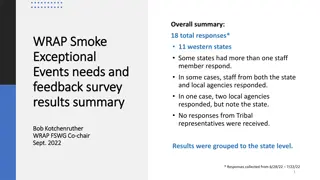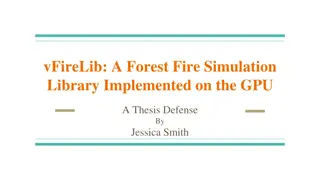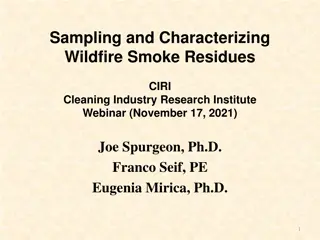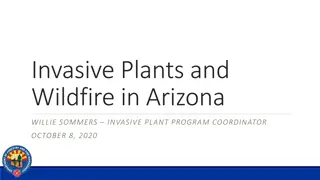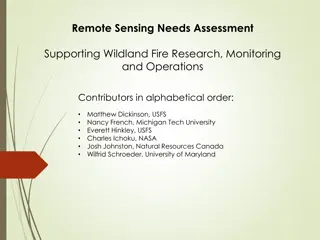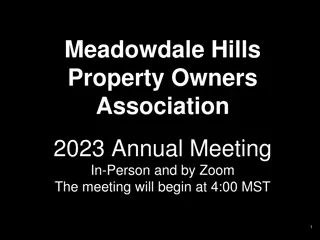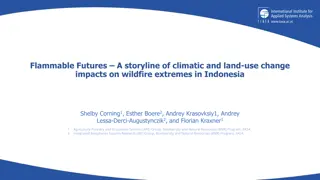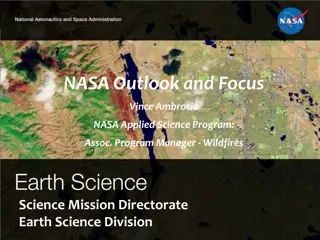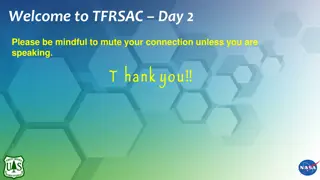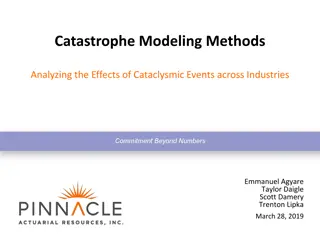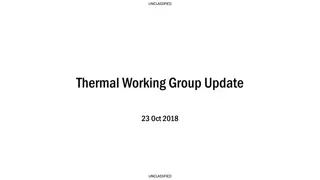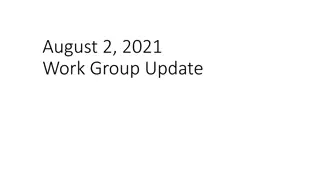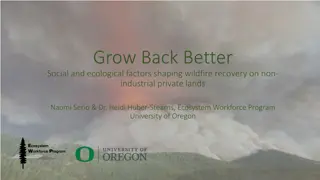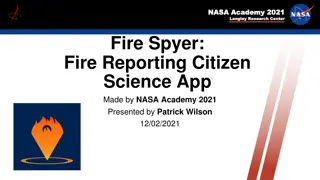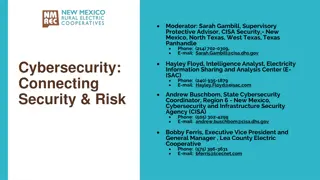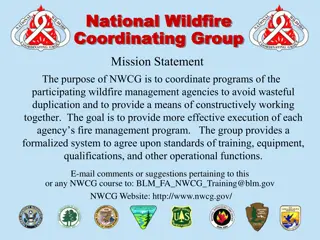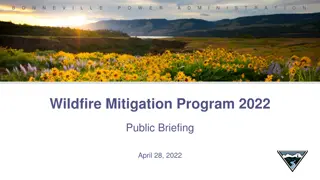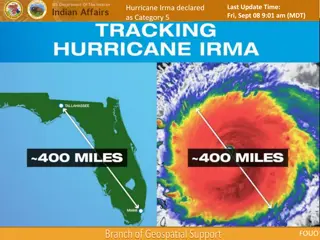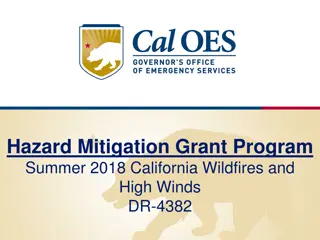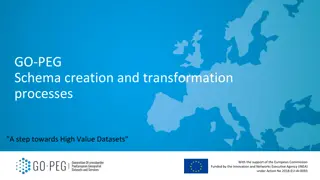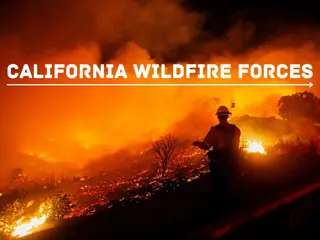The Wicked Wildfire Problem and Solution Space
This article discusses the increasing prevalence of megafires and the need for innovative solutions. It introduces the concept of WKID Innovation, a framework for systemic change, and presents recommendations for tactical fire management. Collaboration and deep dive studies are emphasized to address
16 views • 11 slides
IGAP STATE MONTHLY WEBINAR
Exciting updates from the IGAP State Monthly Webinar in May 2023, featuring Green-Up insights, EPA FY24 updates, training schedule enhancements, subaward opportunities, and key resources on topics like flooding and wildfire preparation. Don't miss the upcoming webinars scheduled for June 21st and pl
1 views • 10 slides
Understanding Normal Conditions of Use for New Propulsion Technologies in Vehicles
Explore the concept of normal conditions of use for vehicles with new propulsion/charging technologies. Learn how to assess and define normal conditions, operating modes, worst case scenarios, and overview of current technologies. Discover the approach to measure normal conditions and testing requir
1 views • 8 slides
Prescription Development and Scheduling in Wildfire Management
Explore the essential steps involved in developing prescriptions for prescribed fires, including identifying objectives, calculating fire behavior, and setting parameters. Learn about prescription variables, fire modeling outputs, and documentation requirements. Understand the importance of precise
0 views • 25 slides
Understanding Boolean Algebra: Duality Theorem, De-Morgan's Law, and Don't Care Conditions
Boolean algebra concepts such as the Duality Theorem, De-Morgan's Law, and Don't Care Conditions are essential for digital circuit design. The Duality Theorem states the relationship between a Boolean function and its dual function by interchanging AND with OR operators. De-Morgan's Law helps find t
0 views • 10 slides
National Wildfire Coordinating Group (NWCG) - S-200 Initial Attack Incident Commander Course Overview
NWCG aims to enhance coordination among wildfire management agencies to improve fire management program effectiveness. The S-200 course focuses on transitioning from Operations to Command roles, developing leadership skills, incident management, and evaluation techniques. Student evaluation includes
0 views • 12 slides
Understanding Social Determinants of Health
Chronic conditions like heart disease and cancer have multiple causes, not all biological. Social epidemiology studies the social distribution of health, morbidity, and mortality risk influenced by social status and conditions. Factors such as age, gender, race, socioeconomic status, and social cond
0 views • 32 slides
National Wildfire Coordinating Group - S-270 Basic Air Operations Course
NWCG's mission is to coordinate wildfire management agencies, avoid duplication, and enhance program effectiveness. The S-270 Basic Air Operations course aims to provide a foundational understanding of different aspects of Air Operations, including course logistics, objectives, and reference materia
0 views • 14 slides
Real Estate Fire Disclosures and Defensible Space Updates
Updates on fire hardening, defensible space disclosure, and addendum requirements in real estate transactions. Includes revisions to disclosure questions, defensible space decision tree, and wildfire disaster advisory. Resources for maximizing member legal services are also highlighted.
0 views • 7 slides
Boreal Wildfire Effects and Research Synthesis
The thematic breakout report focuses on the impacts of fire and insect disturbances on the environment, with projects studying wildfires in boreal regions and their effects on ecosystems. Various studies funded by agencies like NASA and ERC aim to understand wildfire vulnerability, resiliency, and c
0 views • 10 slides
Fuego: AI-Based Wildfire Intelligence System Detecting Rapid Wildfire Behavior
Fuego, developed by Fuego Group UC Berkeley and Fireball, is a real-time AI-based system focusing on wildfire behavior in the Wildland-Urban Interface (WUI). The system detects wildfires early, surpassing predictions for 2080 severity. It emphasizes the impact on low-income communities, particularly
1 views • 11 slides
FireMapper Enterprise: Enhancing Wildfire Management
FireMapper Enterprise is a comprehensive mapping system designed to assist in managing wildfires effectively. It offers offline functionality, easy fireground feature addition, live map generation, resource tracking, and seamless information sharing between systems. Access is tailored for administra
0 views • 10 slides
Strategic Operational Planning Unit 4 Extended Response Exercise
This content pertains to Unit 4 of Strategic Operational Planning (S-482) focusing on an extended response exercise related to a wildfire scenario. It includes objectives, student materials, instructions, and a review of tasks to be completed. The content is accompanied by images and provides guidan
0 views • 6 slides
NWCG S-271 Helicopter Crewmember Course Overview
NWCG S-271 Helicopter Crewmember course is aimed at coordinating wildfire management agencies to enhance efficiency and standardization. The course covers various aspects including logistics, introductions, objectives, and instructional methods to ensure proficiency in helicopter use. Participants l
0 views • 17 slides
Impacts of Climate Change on Air Quality and Health in the United States
The Fourth National Climate Assessment, Vol. II, highlights the increasing risks from air pollution in the United States, impacting over 100 million people in communities where air quality exceeds health-based standards. Climate change worsens air pollution levels, leading to adverse health effects,
0 views • 10 slides
Navigating Homeowners Insurance Claims Process After a Disaster
Understand how to navigate the homeowners insurance claims process effectively after a disaster such as a wildfire. Learn about the steps involved, including contacting your insurer, preparing for the adjuster's visit, determining settlement, selecting a contractor, and managing expectations. Helpfu
0 views • 10 slides
Understanding Wildfire Risk Mitigation Among Private Landowners
Activities involving fuel reduction and defensible space are crucial among private landowners for mitigating wildfire risks. Factors influencing mitigation behavior include wildfire hazard, past experiences, perceived risk, and social context. Information from local government agencies and fire awar
3 views • 15 slides
National Wildfire Risk Assessment and Mitigation Strategies
The National Risk Assessment focuses on identifying and prioritizing hazardous fuels reduction projects to mitigate wildfire risks. Strategic objectives include developing a national risk model and tracking changes over time using a risk index based on national-scale datasets. Leveraging methods out
0 views • 20 slides
Wildfire R&D Related Opportunities and Statistics Overview
Comprehensive overview of wildfire-related research and development opportunities, outlining statistics on wildfire suppression costs, fire incidents, and acres affected. The content includes workshop goals, stakeholder needs assessment, and key challenges in the field. Insights from SME inputs, lit
0 views • 18 slides
Wildfire Smoke Exceptional Events Survey Summary
Survey results indicate that staff across various organizations in 11 Western states possess the expertise to develop wildfire smoke exceptional events demonstrations for particulate matter and ozone. The majority of states express readiness to assist other organizations and seek training to enhance
0 views • 17 slides
vFireLib: Forest Fire Simulation Library on GPU
Dive into Jessica Smith's thesis defense on vFireLib, a forest fire simulation library implemented on the GPU. The research focuses on real-time GPU-based wildfire simulation for effective and safe wildfire suppression efforts, aiming to reduce costs and mitigate loss of habitat, property, and life.
0 views • 95 slides
Comparison of Wet-Wipe and Tape Lift Methods for Sampling Wildfire Smoke Residues
This research study compared the performance of wet-wipe and tape lift sampling methods for evaluating the impact of surface char from wildfire smoke residues. The study involved sampling 48 houses in Southern California affected by different wildfires, utilizing side-by-side replicate samples colle
0 views • 56 slides
Managing Invasive Plants and Wildfire in Arizona
The Invasive Plant Grant Program in Arizona is actively combating invasive plant species to prevent wildfires and preserve ecosystems. State funds are allocated for projects targeting species like Saltcedar and Buffelgrass. Grant criteria and projects in 2019 and 2020 reveal a focus on eradicating n
0 views • 19 slides
Remote Sensing Needs Assessment for Wildland Fire Research
Contributors from various institutions are collaborating to identify and improve remote sensing products to support wildland fire operations, monitoring, and research. Existing and prospective products along with their limitations are explored in phases such as pre-fire, active fire, and post-fire.
0 views • 17 slides
Meadowdale Hills Property Owners Association 2023 Annual Meeting Agenda
The Meadowdale Hills Property Owners Association is hosting its 2023 Annual Meeting both in-person and via Zoom. The agenda includes important topics such as financial reports, elections for the board of directors, fire safety reminders, updates on short-term rental amendments, and community wildfir
0 views • 26 slides
Impacts of Climate Change on Wildfire Extremes in Indonesia
A study explores the impacts of climatic and land-use changes on wildfire extremes in Indonesia, focusing on current and future climate-driven fires. The research examines the influence of factors such as drought, economic policies, and adaptation efforts on burned areas, agricultural losses, and la
0 views • 9 slides
NASA Wildfire Management Program Overview
NASA's Applied Science Program focuses on wildfire management efforts through the ROSES-2011.A.35 solicitation, aiming to enhance decision-making and actions related to wildland fires. The program supports research projects, collaborations with the fire community and sister agencies, and outreach ac
0 views • 11 slides
TFRSAC Day 2 Meeting Overview & Objectives
The 35th Tactical Fire Remote Sensing Advisory Committee (TFRSAC) meeting hosted by USDA Forest Service and NASA focuses on advancing wildland management practices and enhancing fire observation capabilities. The agenda includes sessions on AI/ML in support of wildfire management, wildfire decision
0 views • 6 slides
Understanding Catastrophe Modeling: Analyzing Effects of Cataclysmic Events
Catastrophe modeling is vital in risk management for various perils like earthquakes, hurricanes, and pandemics. This method, blending actuarial science, engineering, meteorology, and seismology, assesses risks probabilistically and deterministically. Learn about its history, components, and major p
0 views • 23 slides
Thermal Working Group Update and Programs Overview
The Thermal Working Group (TWG) acts as a coordinating body to facilitate the development, integration, and dissemination of thermal data for civil users. This group is focused on enhancing the capabilities of systems like Hawkeye, which provides near real-time wildland fire alerts to various agenci
0 views • 10 slides
Environmental Work Group Updates - August 2021 Progress
Fire & Smoke, Oil & Gas, RTO, and WESTAR/WRAP work groups provided updates on their progress in various areas such as stakeholder workshops, data resource updates, modeling research, and ongoing meetings. The updates include discussions on wildfire smoke issues in tribal communities, refining work g
0 views • 5 slides
Exploring Social and Ecological Factors in Wildfire Recovery on Private Lands
This study delves into the social and ecological aspects influencing wildfire recovery on non-industrial private forest lands post the Labor Day fires. Focusing on NIPF landowners, the research aims to understand the factors shaping resilience and recovery at the landscape level, including the role
0 views • 12 slides
Enhancing Wildfire Response with Fire Spyer: A NASA Academy Innovation
Fire Spyer, developed by NASA Academy 2021 at Langley Research Center, is a cutting-edge citizen science app that revolutionizes fire reporting and monitoring. It addresses issues in current methods by providing real-time data collection, streamlined reporting, and integration with existing systems.
0 views • 7 slides
Comprehensive Energy Conference Speaker Details
The list includes prominent speakers from various sectors discussing cybersecurity, wildfire management, broadband opportunities, and rural economic development. Key individuals such as Sarah Gambill, Andrew Buschbom, and Teresa Ferguson offer insights on critical topics in the energy industry.
0 views • 5 slides
National Wildfire Coordinating Group Mission Statement and Course Objectives
NWCG aims to coordinate wildfire management programs efficiently to enhance execution, avoiding duplication. The course objectives focus on understanding the structure of Expanded Dispatch and developing skills in mobilizing incident resources, effective communication, and fostering positive relatio
0 views • 13 slides
BPA Wildfire Mitigation Program 2022 Public Briefing Overview
The BPA Wildfire Mitigation Program 2022 Public Briefing, held on April 28, 2022, highlighted various aspects including the fire season outlook, wildfire mitigation plan, public safety power shutoff, and strategic management updates. The program aims to address wildfire risks in the BPA service terr
0 views • 18 slides
Latest Updates on Hurricane Irma and Evacuation Guidelines
Stay informed about Hurricane Irma's path and potential impact with the latest updates on wind speeds, precipitation amounts, evacuation routes, and wildfire conditions. Ensure your safety by following evacuation guidelines. Stay alert and prepared during this challenging time.
0 views • 9 slides
Mitigating California Wildfires: Hazard Mitigation Grant Program Overview
The Hazard Mitigation Grant Program (HMGP) aims to reduce loss of life and property from future disasters by implementing long-term risk reduction strategies. The program focuses on creating or updating Local Hazard Mitigation Plans, prioritizing post-wildfire mitigation activities, including soil s
0 views • 18 slides
Challenges in High-Value Datasets Creation and Transformation Processes
The creation and transformation process of high-value datasets, such as POP-WILDFIRE, face challenges like schema harmonisation, schema creation, and data transformation. Issues include identifying pan-European datasets, data pre-processing, aligning with INSPIRE directive, and adapting existing met
0 views • 6 slides
California wildfire forces
Sheriff deputies in Malibu were going door to door ordering people to evacuate as a nearby wildfire rapidly intensified, threatening homes in the beach community.
1 views • 24 slides
